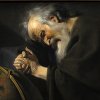“ The assertor of the all-sufficiency of nature in regard to causality (transcendental Physiocracy) , in opposition to the doctrine of freedom, would defend his view of the question somewhat in the following manner. ”
Immanuel Kant, Critique of Pure Reason (1791). copy citation
| Author | Immanuel Kant |
|---|---|
| Source | Critique of Pure Reason |
| Topic | causality freedom |
| Date | 1791 |
| Language | English |
| Reference | |
| Note | Translated by J. M. D. Meiklejohn |
| Weblink | http://www.gutenberg.org/files/4280/4280-h/4280-h.htm |
Context
“The justification of this need of reason to rest upon a free act as the first beginning of the series of natural causes is evident from the fact, that all philosophers of antiquity (with the exception of the Epicurean school) felt themselves obliged, when constructing a theory of the motions of the universe, to accept a prime mover, that is, a freely acting cause, which spontaneously and prior to all other causes evolved this series of states. They always felt the need of going beyond mere nature, for the purpose of making a first beginning comprehensible.
ON THE ANTITHESIS.
The assertor of the all-sufficiency of nature in regard to causality (transcendental Physiocracy) , in opposition to the doctrine of freedom, would defend his view of the question somewhat in the following manner. He would say, in answer to the sophistical arguments of the opposite party: If you do not accept a mathematical first, in relation to time, you have no need to seek a dynamical first, in regard to causality.” source
ON THE ANTITHESIS.
The assertor of the all-sufficiency of nature in regard to causality (transcendental Physiocracy) , in opposition to the doctrine of freedom, would defend his view of the question somewhat in the following manner. He would say, in answer to the sophistical arguments of the opposite party: If you do not accept a mathematical first, in relation to time, you have no need to seek a dynamical first, in regard to causality.” source


